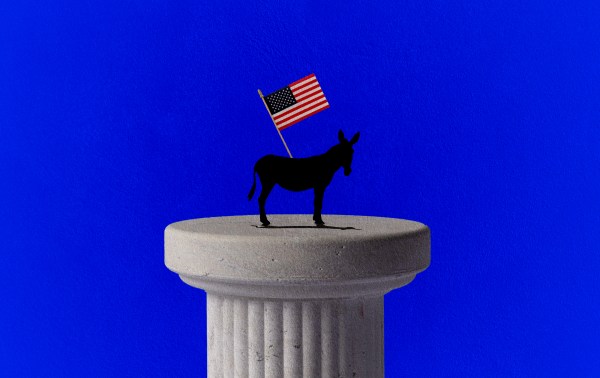God must love Americans—why else would He have made so many of us? In particular, the Almighty seems to have a soft spot for clickbait-addicted and Facebook-addled U.S.A.-type rage monkeys. While I am loath to criticize the Architect of the Universe regarding His production schedule, it does seem to me that we are oversupplied in that category and that, pound-for-pound of total organic matter, the world would be better off with more hummingbirds or giant redwoods or moose. Memo to follow, etc.
The size of the American population means that we have an enormous market and an enormous electorate—and the vast scale of American life also ensures that the American market and the American electorate must come to resemble each other in certain ways. In the United States, you can be a boutique firm—or a boutique political tendency—and still appeal to millions upon millions of clients. If you have 10 million customers in the United States, you haven’t even quite hit 3 percent of the population—but that same 10 million figure would encompass 95 percent of the population in Sweden, nearly 200 percent of the population in New Zealand or Ireland, 250 percent of Panama, etc.
As a non-paying reader, you are receiving a truncated version of Wanderland. You can read Kevin's full newsletter by becoming a member here.
The size of the American enterprise as compared to that of smaller countries has always ensured that American life interacts in a particularly intense way with mass media. All modern societies are vulnerable to mass-media influence, of course, but consider, for comparison, a country such as Iceland, which is a real country, a rather nice and decently governed one—with a population about the same as that of Pulaski County, Arkansas. For better and for worse, there is a kind of intimacy in a small country such as that, and social trends driven by mass media—including, in our time, those driven by social media—will be somewhat dampened by personal relationships and direct personal knowledge of relevant facts and relationships. (I remember a writer visiting from Iceland when I was in college, and pretty much the first thing she said was: “Yes, I know Bjork. Of course I know Bjork. I know everybody.”) A comfortable majority of Icelanders belong to the same church (the established state church, which is Lutheran), 93 percent of them are members of the same ethnic group, and they speak a complicated language that was inherited from Vikings and has more genders than Republicans are comfortable with. It is harder to pull off divide-and-conquer demagoguery in a population like that—and, if you did manage to get 3 percent on the march, you still wouldn’t be able to fill up the high-school football stadium in Odessa, Texas, or even get close to doing so.
Things are different here in the United States. Even if we take at face value the Catholic Church’s probably inflated membership numbers, no more than 20 percent of Americans belong to the same church. That is a smaller share of Americans than the share who speak a language other than English at home (about 22 percent), and, depending on how you count, there are around 400 languages spoken in this country. If we pretend that “non-Hispanic white” is a meaningful ethnicity, that is still only 50-odd percent of Americans. If Americans who were born in another country were counted as a country of their own, that country would have about 130 times the population of Iceland, or a population a smidge bigger than that of Spain or South Korea.
Big American numbers and big American diversity ensure that sophisticated practitioners of modern digital communication—commercial or political—have many opportunities to slice and dice the population in ways that can produce various kinds of economically viable enterprises based on affinity groups that are relatively large in gross numbers even if they are quite small—even minuscule—as a share of the overall population. The phenomenon is driven largely but not exclusively by economic factors—or, more precisely, by factors that are most easily understood and explained in economic terms. A television show can get a million viewers without leaving much mark on the wider culture (I wonder how many white people watched an episode of Mann & Wife), books that sell more than 1 million copies sink with barely a ripple on the wider literary culture (The Seven Husbands of Evelyn Hugo was well-reviewed and sold a million-and-a-half copies, but I suspect that most readers of modern fiction who are not on TikTok have never heard of it), microtrends in fashion, music, dance, and slang become very big deals for very narrow populations.
This is old stuff, I know, but it is worth revisiting: In the old days of three television networks (yeah, yeah, I’m a Generation Xer raised on hose water), towns with two or three cinemas and one or two bookshops, relatively expensive travel, limited venues for live performances, entertainment products (and most other products) had to be crafted to appeal to relatively large audiences—large both in absolute terms and large as a population share. You know the numbers: Nearly half of Americans watched the final episode of M*A*S*H*, many more people watched Johnny Carson’s Tonight Show on a given Tuesday night than all of the contemporary major-network late shows combined, etc.
Mario Puzo’s The Godfather (1969) spent 67 weeks on the New York Times bestsellers list, while M. Scott Peck’s self-help book The Road Less Traveled (1978) spent an astounding 694 weeks on the list. And you still get some of that in the world of books—Diary of a Wimpy Kid was on the list for 600 weeks, and the Harry Potter books were so dominant that the Times created a new children’s list just to give everybody else a chance at the main one. I suspect that this has something to do with the physicality of books. (Ask Adam Bellow.) Digital books are a thing, but the enduring popularity of physical books means that the book market of today looks a lot more like the book market of 1980 than the newspaper (“paper”) market of today looks like the newspaper market of 1980.
I suppose there is a neo-Marxist point hiding in there somewhere about how society is shaped by the means of production—and, in the case of film, television, and news media, by the means of distribution. Economically, it is in our time often much more effective to discover and then strip-mine an energetic and underserved niche than to create (if it is even possible) a product with the kind of mass appeal that Johnny Carson or network sitcoms had. The old model was based on addition. (“How do we add one-tenth of a point to our audience? Cute dogs? An obviously stereotypically gay character who is never acknowledged to be gay? Maybe Fonzie could do a motorcycle jump over a shark?”) But the new model is based on division. “Division” is a word that has a bad odor among some people, but the old model produced a lot of very bland pabulum while it was creating that common popular culture so often lamented—go back and watch some Ozzie and Harriet or My Three Sons or the Andy Griffith Show, and I think you will see that none of it is as good as you remembered. As it was on television, so it was at the movies: The 1970s may have been a golden age of American cinema, but there was a lot of uninteresting dreck on the silver screens on Saturday nights.
We have a fractured political marketplace for the same reason we have a fractured market in television and movies and music. That presents some problems, a critical one being a version of the old “agent-principal problem” that presents itself in business management. The heart of the agent-principal problem is that the people we pay to do things on our behalf have incentives different from ours—and, sometimes, incentives that are antithetical to ours. The classical example is corporate management: The shareholders, who are the owners of the company, have an interest in maximizing profits; the management team has an interest in maximizing its own income, even if that reduces overall profits. (Businesses have tried to fix that over the years by paying executives in stock options or doing other things to align management’s incentives with those of shareholders.) Political parties, campaigns, other political institutions, activist groups, policy shops, communications platforms—all of these have people who get paid something, and who sometimes get paid a great deal. They also have paid workers and volunteers who are looking to use their positions in a campaign or in party leadership to advance their own economic (and non-economic) interests, parlaying those jobs into highly paid cable-pundit gigs, comfortable academic or corporate-board appointments, or a spot on the bestsellers list.
Now, here is a question to answer honestly if only to yourself: Would you rather earn $100,000 a year managing winning campaigns or $1 million a year managing losing campaigns? You can live on $100,000 (most Americans live on less), but you can live really well on $1 million. Or: Would you rather earn $100,000 a year managing a responsible and intelligent social-media operation on behalf of your party or interest group, or would you choose instead to earn $1 million a month running a gross, ugly, embarrassing one that ultimately does your team more harm than good? I have no idea what my friend David French earns but, without even asking, I can tell you that, ceteris paribus, I’d rather have Joe Rogan’s paycheck.
You can be a good political consultant and do everything right and still lose the election. But you also can lose the election without being a good political consultant and doing everything right. You can be a good, responsible, intellectually honest commentator or advocate or activist and earn a pretty good living, even a very good living—or not. But you also could be someone like Candace Owens or J.D. Vance and advance your interests by means of risible buls—t that gets you what you want while ultimately undermining the project that you supposedly are trying to advance. From that point of view, Trump economic adviser Kevin Hassett (a former National Review colleague of mine) and Tucker Carlson (whom I used to think I knew) are really two guys in their same occupation (it is the oldest occupation) but working different sides of the street.
There are certain features of our politics—such as the political inertia in effectively single-party states (such as California and Oklahoma), the prevalence of noncompetitive legislative districts, the centralization of congressional decision-making in party leadership, polarization in the electorate, and the abovementioned splintering of the media environment—that work together to enable the advancement of political figures who are largely untested in a competitive electoral environment. Kamala Harris, to take an obvious example, had only twice faced a Republican in a general election—and in her 2010 attorney general’s race, she beat the Republican by less than a point … in California. In her election to the Senate, there was no Republican in the race.
The Democrats should not have nominated Harris in 2024, of course (as so often is the case, they missed an opportunity to listen to me), and when she was the candidate, it was plain that she did not know how to run such a race and that she could not tell good advice from poor advice. But the money came rolling in, anyway—and when you put more than $1 billion on the table, somebody is going to figure out a way to pick up that money. (And then some—the Democratic Party recently agreed to pay off some $20 million in Harris campaign debt.) A lot of consultants got some very non-mediocre paydays selling Harris mediocre advice.
Donald Trump, who surely must once have failed a remedial course titled “Your Ass and a Hole in the Ground: A Comparative Study,” got a lot of bad advice on his way to losing to an effectively housebound Joe Biden in 2020—he was poorly served by the richly paid. And Biden, let us recall, had very little experience with tough campaigns, having been second banana tagging along to the coronation of Barack Obama, before which he hadn’t been involved in a truly competitive race since 1972. In 2020, Trump wasn’t running against Machiavelli—he was running against the Spiro Agnew of the geriatric ward, and he lost.
Political consultant Bob Shrum had already lost seven out of seven presidential races when John Kerry brought him on board in 2004. Shrum extended his unbroken losing streak to 0-8, but he still had a pretty nice vacation home in Cape Cod and a chair at USC.
Not all of these principal-failing agents are alike. Maybe Shrum and Steve Bannon and lefty YouTuber/poster boy for literal nepotism Hasan Piker are better sorts than I think they are. (Probably not, but, I could be wrong.) But it seems to me that figures such as Hasan Piker and Candace Owens (same sport, different jerseys) are pretty obviously net losers for their teams, and that they are more the rule than the exception.
This stuff has real-world consequences. Consider this from the New York Times: “The Texas Democrats Won by Losing,” reads the headline. (That’s how it came in the morning email; it’s different on the website.) The Democrats are engaged in a time-honored strategy, according to the Times: “Losing loudly has been a crucial feature of successful political movements.” The attached essay was written by two philosophy professors with a book to promote, titled Somebody Should Do Something: How Anyone Can Help Create Social Change. I am something of a connoisseur of the “moral victories” of Texas Democrats such as Wendy Davis. Texas Republicans are happy to let Texas Democrats have all the moral victories they want—the Republicans are satisfied with their actual victories. Some of those are moral victories as well as electoral ones, but then there’s Ken Paxton.
If Texas Democrats had about 10,000 votes for every “moral victory” they’ve scored in recent years, then Beto O’Rourke would be a senator and Ted Cruz would be a servile invertebrate, but one earning a decent living in private legal practice. It is not as though no one ever has “won by losing”—there is some precedent in Texas: It is true that you don’t get the victory at San Jacinto without the slaughter at the Alamo, but when the guys who run the show are getting paid by the casualty, then it’s just one more Alamo after another after the next. In close political contests, mostly you lose by losing. College basketball coach Bob Huggins once was asked about his game plan and famously answered: “Score more points than they do.”
And I’m all for sticking to your principles even when it means losing an election—but the trollification of our politics isn’t about putting honor over ambition. Ain’t nobody going to mistake Gavin Newsom for Cato the Younger.
The people at the top of the political heap on both sides owe it to their teams to figure out—and be clear about—what it is they are doing. Appealing to ever-narrower and ever-more-angry sub-sub-subdivisions in the electorate is a good way to build a cable-punditry career or a social media following or to sell doggie vitamins or hair tonic or whatever, but when it comes to carving out functional political coalitions, you want to be Rick Ross: “Cut ’em wide, cut ’em long, cut ’em fat.” (That’s what Rick Ross is talking about there, right? Team-building?) Otherwise, it’s just a wide, long, fat payday for people who have learned how to be relatively big fish by seeking out smaller ponds.
And Furthermore ...
In their defense, those win-by-losing philosophy professors know that they are pushing some weak product, which is why their essay has more qualifications than James Baker’s résumé:
“Texas Democrats’ stand gave their cause time to move the needle of public perception. Their battle invigorated a nationwide conversation about how elected leaders can resist America’s anti-democratic turn.
“Losing loudly doesn’t always work. In Texas in 2013, the state senator Wendy Davis famously filibustered an anti-abortion rights bill, initially defeating the measure and giving a shot in the arm to supporters of abortion rights. But not only did a similar bill ultimately pass, less than a decade later the Supreme Court struck down Roe v. Wade.
“A reasonable skeptic might also predict that losing in public would tend to discourage a movement’s supporters. In sports, the idea of “no moral victories” is a cliché. But researchers who study social movements find the opposite. Once people persist in the face of a likely defeat, they often keep fighting.
“Why? People willing to lose loudly aren’t deceiving themselves about their power or their prospects.
“ ... A comprehensive analysis of protesters in places including Russia, Turkey and Hong Kong found that they were not motivated primarily by belief in their immediate effectiveness, but instead by factors including a shared sense of identity and faith in protest as a way to build a movement.”
Just so. And it does seem that Texas Democrats are about as close to accomplishing their goals as the democracy activists in Russia, Turkey, and Hong Kong! So they’ve got that going for them.
Words about Words
Seriously—have you ever seen James Baker’s résumé? Neither have I.
But I do remember receiving a press kit for an event he was doing (a speech at the University of Texas, if I recall correctly) a long time ago, one that included a biographical sketch that was, in essence, a résumé. It was one page long. When I was a youngster, we used to think a great deal about the writing of résumés, which were thought at the time to be a big deal. (And maybe they were, though I don’t think I’ve really ever been asked for one.) And there were a great many 22-year-old holders of bachelor’s degrees who were veterans of three summer jobs, two internships, and one club presidency who refused to believe that the splendiferousness and nuance of their careers so far could possibly be captured on a single page.
James Baker was on the losing side of a lot of political campaigns, but he led the winning side of a big one (George H. W. Bush for president in 1988) and a lot of very important policy fights, including some that were instrumental in seeing the United States achieve an affirmative victory in the Cold War and fortifying our dominant position in the post-Cold War order. He was secretary of state and White House chief of staff and had a big-time business career, too. After the White House, he had a hand in everything from climate policy to African politics. He ran George W. Bush’s team during the 2000 Florida recount. It’s the kind of résumé you’d associate with a man running for president more than with a guy running the campaign team.
The most recent bio on his website is about 500 words, including the note about his having 17 grandchildren.
Fewer but better–that good advice applies to words as well as to possessions. There is something to be said for verbal economy in résumés, bios, eulogies, and obituaries. It is difficult to imagine anybody will ever top Christopher Wren on that score: “SI MONUMENTUM REQUIRIS,” reads the engraving at St. Paul’s, “CIRCUMSPICE.”
That, I believe, is what they call a flex.
Elsewhere
You can buy my most recent book, Big White Ghetto, here.
You can buy my other books here.
You can check out “How the World Works,” a series of interviews on work I’m doing for the Competitive Enterprise Institute, here. Up next: Rachel Barkley of Able Americans.
In Closing
Happy Labor Day to all you toiling masses.
Labor Day is a special holiday for me, one that I generally do not take off: The first piece I ever published at National Review was a Labor Day essay, one that noted that I had never held a minimum-wage job (and I still haven’t—so far!) even though I had a lot of jobs that people think of a minimum-wage jobs: Burger King flame-broiler guy, 7-Eleven clerk, furniture mover, day laborer. Think of all the radically different thinkers—from Josemaría Escrivá to Mohandas Gandhi to Ludwig von Mises—who have put the dignity and goodness of work at the center of their various philosophies.
My friend David Bahnsen has written a book on the subject: Full-Time: Work and the Meaning of Life, in which he makes a case for rejecting the idea of “work-life balance” and instead integrating work into our self-conception as beings created, in God’s image, to work.
There is a cartoon version of conservatism in which the conservative is a well-heeled guy in pinstripes sneering at a beggar with a tin cup: “Get a job.” Well. “Get a job” is often excellent advice, something one appreciates all the more if one has had the experience of needing employment and not having it. Of course there is an enormous element of luck and randomness and chaos in life: I wonder how different my life might have been if I hadn’t decided to write that Labor Day piece on a whim or if I hadn’t sent it to Kathryn Jean Lopez on a day when she needed copy.
But we ought not allow ourselves to fall into a false dilemma: No, we may not have control over everything, or even much, but we do have control over some things, and hard, consistent work can make up for a lot of deficiencies in other areas. That is one of those eternal truths that can slip away from us as we grow comfortable or complacent, and, as such, it is one of those eternal truths to which we must regularly rededicate ourselves with purpose and conviction.








Please note that we at The Dispatch hold ourselves, our work, and our commenters to a higher standard than other places on the internet. We welcome comments that foster genuine debate or discussion—including comments critical of us or our work—but responses that include ad hominem attacks on fellow Dispatch members or are intended to stoke fear and anger may be moderated.
With your membership, you only have the ability to comment on The Morning Dispatch articles. Consider upgrading to join the conversation everywhere.